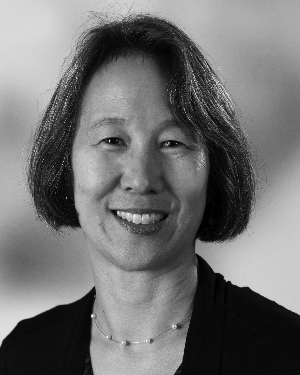Denise Koo, MD ’88, MPH : Making health a public concern for UCSF and the nation
Denise Koo discovered public health almost by accident.
 She entered medical school at UCSF without clear direction. “I wasn’t one of those people who knew I wanted to be a doctor since I was a kid,” she says.
She entered medical school at UCSF without clear direction. “I wasn’t one of those people who knew I wanted to be a doctor since I was a kid,” she says.
Medical school didn’t feel analytical enough, as it required too much memorization. She was ready to quit, but then she took a class in epidemiology with Virginia Ernster, PhD, professor emerita of epidemiology and biostatistics.
“She was wonderful,” Dr. Koo says. “She taught us something that I’ve repeated over and over again: The doctor tries to figure out what disease a given patient has, while the epidemiologist tries to figure out what kind of person has a given disease.”
This put Dr. Koo on the path to a 25-year career with the US Centers for Disease Control and Prevention (CDC).
She spent much of that career, and the time since her 2016 retirement, broadening understanding and participation in public health among medical professionals – an effort she brings to her volunteer role as vice president of the UCSF Medical Alumni Association.
“A lot of people who go to UCSF become clinicians, but I had a slightly different route,” says Dr. Koo, who still lives in Atlanta, home of the CDC. “I’ve always been one to proselytize around public health as an option for those who might not feel that they are on a straight-and-narrow medicine path.”
Disease Detective
Dr. Koo, who grew up in Mountain View, Calif., had as scientific a background as one could imagine. All four of her grandparents were college-educated in the sciences. Her father was a chemical engineer, her mother a chemistry major.
Dr. Koo loved science from the start and headed to Harvard University, thinking she would go into engineering. Instead, she soon changed to a biochemistry major with the intention of working in laboratory science.
Once she had found public health at UCSF, she pursued it wholeheartedly, earning a Master of Public Health degree at UC Berkeley between her third and fourth years of medical school.
After residency at Brigham and Women’s Hospital in Boston, she joined the CDC for a pair of postdoctoral positions, serving as an epidemic intelligence service officer (a disease detective) in California and studying foodborne diarrheal diseases in the US and Latin America.
Dr. Koo’s first proper job at the CDC involved running the National Notifiable Diseases Surveillance System, the national reporting system for infectious diseases. In the 1990s, she helped deal with a small E. coli outbreak in San Diego, the appearance of cholera in Los Angeles, and a serious drug-resistant tuberculosis that included an outbreak in San Quentin State Prison that required her to make frequent visits.
“I tell people I did time in San Quentin,” she says with a laugh.
Dr. Koo ran the notifiable disease-reporting branch for a few years, then became division director at a time when the CDC was trying to improve integration of its national surveillance systems. In her final job at the CDC, as adviser to the associate director for policy, she was chief architect of the CDC Community Health Improvement Navigator, a website that visually depicts how to improve community health and provides resources for collaborative approaches to the issue across states and agencies.
In the early 2000s, Dr. Koo was teaching at the CDC when a donor funded a fellowship program for medical students at the agency.
“I was fascinated by the idea of helping these medical students broaden their perspectives on population-based issues and epidemiology,” she says. “I wanted them as physicians not only to figure out what disease a patient has but also why now, and what could be done to prevent it. My boss saw that I really liked education, and he had me run the entire division.” She spent more than a decade overseeing the program, along with other fellowships at CDC, including the world-renowned Epidemic Intelligence Service program.
Improving Access, Having Fun
The CDC also led Dr. Koo to her husband, Ed, a computer systems manager. They have a 20-year-old daughter, who is a senior at Tufts University studying community health, and a 22-year-old son, who has graduated from college and now shares his mother’s passion for playing pickleball. It’s a sport that takes Dr. Koo’s longtime love of tennis and adds greater opportunity to have fun and be social.
“The court is a lot smaller than a tennis court, and the sport is easy to pick up for anyone,” she says, noting that, as a pickleball coach and public health physician, she guides her students through dynamic warm-ups to prevent injuries. “That makes it more sociable and accessible than tennis, but it’s still competitive.”
In her role as vice president of the UCSF Medical Alumni Association, Dr. Koo has sought ways to make the organization more accessible to those who, like her, live outside California.
“I had such a positive experience at UCSF. I thought it was a wonderful school, with great exposure to real-world issues, and I wanted to get more involved,” she says. “And I still think of myself in a way as a Californian.”